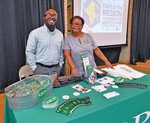





As new money from both the public and private sector moves into Allendale and Barnwell, local leaders are making preparations for the positive and negative effects the new industry will have on the community.
At the Southern Palmetto Center’s State of the Region Business Expo, which was hosted at the University of South Carolina Salkehatchie, these issues were raised by leaders of local governments, businesses and nonprofits during panel discussions. While new money comes into the region, local leaders are preparing for the resulting economic and infrastructural changes.
“Thanks to everyone who made this a beautiful evening featuring new and established businesses, alongside some of the most important leaders in our region,” said Bob Snead, chamber president and CEO.
Housing & Tire Plant
The housing crisis in Allendale and Barnwell persists as a major issue for both counties. Although Allendale and Barnwell have no shortage of existing housing structures, finding an apartment or home that is both safe and affordable in the area is increasingly challenging, as previously reported by The People-Sentinel.
Both elected leaders and Tin Thanh Group Americas officials have said that Allendale County’s new tire plant will bring new housing units. While a revitalization of Allendale’s crumbling manufacturing base is much needed, concerns were raised at the event about the effect that the plant will have on Allendale’s housing market.
The S.C. Regional Housing Authority No. 3, which is responsible for overseeing Barnwell, Allendale and other surrounding counties’ public housing supply, was at the event. The Housing Authority is seeking new funding for public housing, which is in short supply. Although Allendale’s housing prices are some of the lowest in the country, the county’s wages are correspondingly low. Unlike the broader housing situation in the United States, Allendale’s housing prices remain very low; in 2022, average home prices in Allendale were $59,633.
Robert Thomas, executive director of Southeastern Housing and Community Development, spoke to the audience about the contradictory effects that the new industry could have on the housing market. As new jobs move in, employees look for housing, increasing demand, which could push up prices.
“What we’re doing now is recognizing the important advocacy that it’s going to take,” Thomas said. “We all recognize that the issue now is that there is no price that you can get into a house for families that are starting out.”
One of the influences on Allendale’s housing market has been the county’s population decline. In 1990, the county’s population was 11,722. In 2022, Allendale’s population had fallen to 7,579.
“If we continue on the same curve, we’re looking at a drop to 5,800 people in the county by 2030,” Allendale County Council Chairman Matthew Connelly said. “These jobs couldn’t have come at a better time for Allendale County. Our priority should be to address housing locally and the whole region. … Those are a few of the things that Allendale County Council is currently working on.”
Renewable Energy
Although renewable energy technology is outcompeting fossil fuels in cost and efficiency on global markets, capital continues to favor fossil fuels, which are more expensive, and thus more profitable. However, a slew of new tax credits and public grants from both federal and state sources are incentivizing areas like Barnwell and Allendale to get off of planet-warming fossil fuels.
These incentives include: the Inflation Reduction Act’s tax credits for solar panels, heat pumps and batteries; the United States Department of Agriculture’s Rural Energy for America Program, which provides grants and loans to rural areas; and South Carolina’s solar tax credit program.
At the event, Bunch Team Corporation, LLC, promoted tax credits and grants.
The theory is that by helping individuals and businesses with the upfront cost of installing renewable energy technology, the tax credits help pay for the cost of phasing out fossil fuels like natural gas and coal. Once installed, renewable energy technology cuts electricity and heating bills, which have shot up in recent years as a result of utility companies’ capture of the political system, the war in Ukraine and Wall Street speculation.
Manufacturing of solar is also a quickly expanding industry in rural areas of the United States. In nearby Orangeburg County, Chinese solar manufacturer Hounen Solar has announced a $33 million new solar factory.
Infrastructure & Broadband
In addition to new money for renewable energy technology, new money from the Infrastructure, Investment and Jobs Act, which was passed in 2021, is incentivizing new projects to upgrade rural infrastructure, like sewer and water systems, roads and broadband.
Rural areas like Allendale and Barnwell have been left behind on a number of 21st century innovations like broadband. Lack of broadband access can become a barrier for those in need of healthcare, social services and education.
“There’s an extreme focus on broadband,” said Daniel Alexander, Barnwell County Councilman. “The state of South Carolina created a state broadband office … they’re doing a great job getting broadband to houses with students 18 and under.”
Currently, the federal Affordable Connectivity Program provides a discount of $30 per month for internet service for Americans who make under 200 percent of federal poverty guidelines, or qualify for certain government assistance programs. On August 17, Angela Hughes of the Federal Communications Commission appeared at the Allendale County Council meeting to increase awareness of the program.
Additionally, $65 billion in funding for building new broadband across the United States was allocated in the Infrastructure, Investment and Jobs Act, which was passed in November 2021. Large amounts of this money comes to rural communities like Allendale in the form of grants and loans.
As part of the recently announced federal ReConnect Program, Bamberg and Orangeburg counties will each receive $12 million for broadband.
Job Creation & Workforce Development
Kay Maxwell, vice president of SouthernCarolina Alliance, spoke about how their seven-county regional economic development organization has been working to attract industries to the region, including Barnwell and Allendale counties.
Since 2020, $1.5 billion in investment and 5,500 jobs have been created in the region, according to Maxwell. SCA continues to receive calls and work with prospective industries to show them what the region has to offer.
As the region prepares to hire more workers, efforts are underway to improve the region’s workforce by providing job training and skills. Some of these efforts were discussed by Joni McDaniel, the regional workforce advisor for the S.C. Department of Employment and Workforce.
“We've been trying to bring all the leaders of the area together to get some political power together to get some transformational things done so that we will have the workforce in place and so that we'll have infrastructure in place [for new industry],” McDaniel said.
Healthcare
Healthcare is another important component to any community.
Dr. Ashley Barnes, CEO of Low Country Health Care System, was on the panel and spoke about how her organization works to provide accessible and quality primary and preventive health care services to communities of Allendale, Barnwell, Bamberg, Aiken and surrounding counties.
Since the closures of the hospitals in Barnwell and Bamberg counties several years ago, Barnes said her organization has adapted hours and services to help fill some of that void.
As a major employer in the area, she also spoke on the need for finding qualified people to fill openings.
STEM Education
Local non-profit Dreams, Imagination, and Gift Development Program (DIG) has received a $40,000 grant for funding STEM-based development programs. At the State of the Region event and the grant announcement, DIG founder and Williston native Steven Brown spoke about where the grant’s money will go.
“There’s an importance of having that [STEM] exposure in rural communities,” Brown said. “We need STEM programs in rural communities. The goal is to make sure every kid in rural communities understand what STEM is. Living in a rural community, you naturally have an innovative and problem-solving mindset.”
The grant was provided by Power:Ed, the philanthropy wing of the South Carolina Student Loan Corporation, a private lender of student loans.